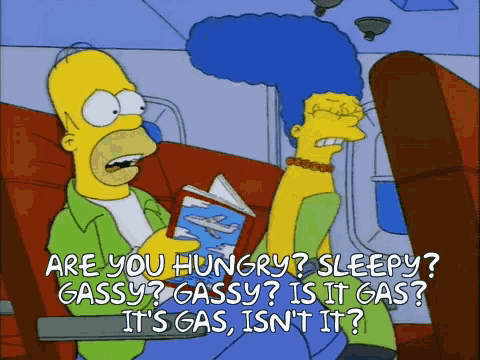Flying can potentially affect our health and well-being in a bunch of ways:
- The pressure changes in the cabin can wreak havoc on your ears, causing extreme ear pain, especially if you’re sick or have allergies or sinus issues (here’s a way to help it)
- Your feet and legs can swell from blood pooling in your lower extremities, and you could even develop a deep vein thrombosis (DVT)—a blood clot that, if it breaks free and reaches your lungs, could be fatal. (here’s a way to avoid this)
- You’re stuck in a tin can with recirculated air for hours, so the chances of catching a cold from the person in 14B behind you, or of the person who sat in your seat on the plane during the flight before you are real (but here’s how to decrease your chances of getting sick).
But flying can also affect us in another way – our digestive system.
Many people complain of feeling bloated or, more often, an increased need to pass gas when they’re on planes. It’s happened often enough that there’s even a scientific name for it: High Altitude Flatus Expulsion (HAFE). The name was developed after studying mountain climbers who experience more flatulence than usual when climbing mountains.
Anyway, it all has to do with pressure. As we discussed in this post, there are pressure changes inside the plane when you’re flying. It’s the pressure that causes your ears to hurt and is the reason for those little holes in the windows of your plane. That pressure on your body, including your belly, could be enough for some people’s colons to want to pass gas.

If you’re prone to this sort of issue, it’s recommended to limit your intake of fiber before flying and increase your consumption of fish, rice, dairy products, and strained fruit juices since they tend to leave less waste in the gut for fermentation. Some people recommend anti-gas medication such as Beano, but personally, I’ve never noticed a major difference with or without. As always, Your Mileage May Vary.
It’s generally recommended to let the air out, by the way. If you “hold it in,” you put yourself at risk for pain and bloating at the time, as well as bowel problems down the line. And if you have issues with odor, they do make underwear (And jeans. And pajamas. AND seat cushions) with activated carbon that filters the gas so the smell doesn’t get out. Unfortunately, there’s nothing yet available to muffle the sound. Pity.
By the way, pilots and flight attendants suffer from the same issue. I’m not sure how pilots deal with it, especially in the relatively small space of a cockpit, but flight attendants have to be sneaky when they pass gas on a plane. They call it “cropdusting” 😉
Want to comment on this post? Great! Read this first to help ensure it gets approved.
Want to sponsor a post, write something for Your Mileage May Vary, or put ads on our site? Click here for more info.
Like this post? Please share it! We have plenty more just like it and would love it if you decided to hang around and sign up to get emailed notifications of when we post.
Whether you’ve read our articles before or this is the first time you’re stopping by, we’re really glad you’re here and hope you come back to visit again!
This post first appeared on Your Mileage May Vary

1 comment
I’m sorry in advance if you are within five rows of me. Better out than in!